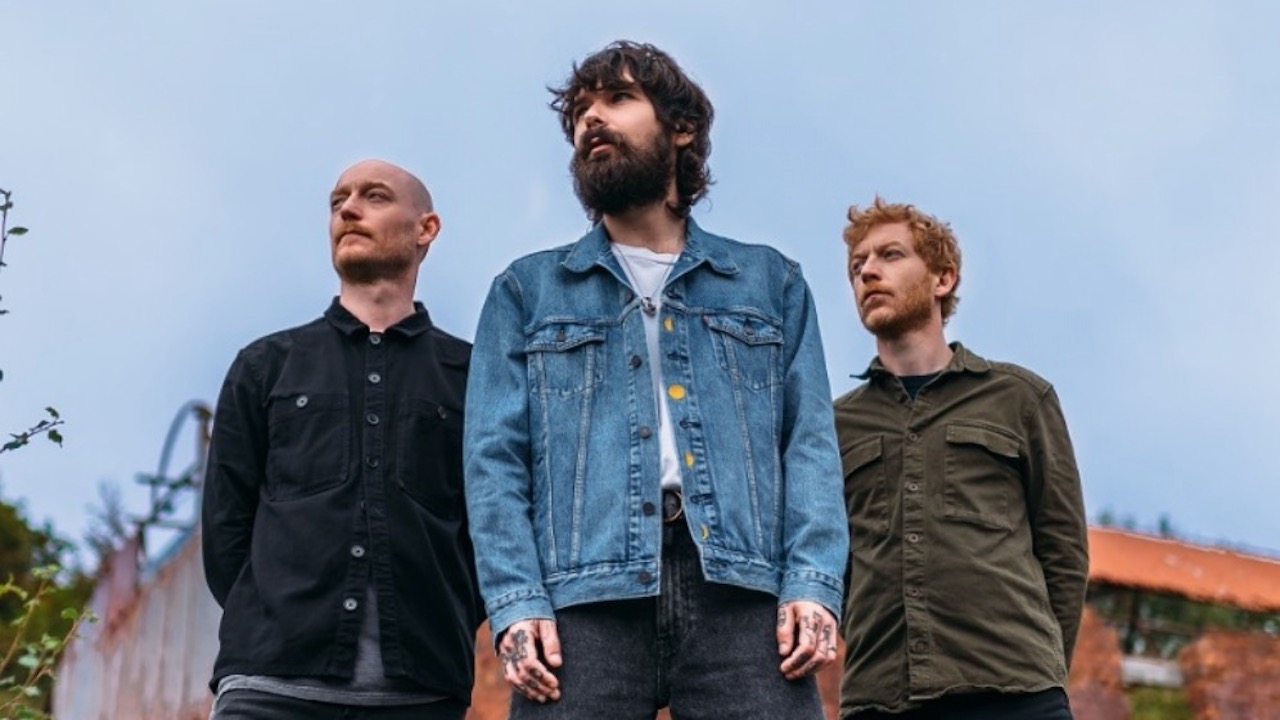With a work ethic which would shame even Dave Grohl, Ayrshire trio Biffy Clyro have gone from being a discordant alt-rock cult concern to platinum-plated festival headliners in the space of two decades.
The three-piece have hit something of a purple patch of late, with a run of three albums in as many years: 2019 film soundtrack Balance, Not Symmetry, 2020’s A Celebration of Endings and its 2021 companion album The Myth of the Happily Ever After.
Currently starring in their own Amazon Prime documentary Cultural Sons of Scotland, here are the band's nine studio records to date ranked from worst to best.

9. Ellipsis (2016)
You can trust Louder Our experienced team has worked for some of the biggest brands in music. From testing headphones to reviewing albums, our experts aim to create reviews you can trust. Find out more about how we review.
Let’s begin by saying that there’s no such thing as a bad Biffy Clyro album, they’re all packed with flashes of brilliance and invention, which makes ranking their studio discography a challenging undertaking.
Described by frontman Simon Neil as “fight rock, pint-in-the-face rock”, their seventh studio collection, and second UK number one album, sets out its stall with the infectious single Wolves of Winter, the agitated Animal Style and the furious On A Bang. A hip-hop beat informs the delicate Re-arrange and, for reasons only known to their label, the goosebump-delivering In The Name of the Wee Man can be found on deluxe versions.
No disappointment, with hindsight, Ellipsis falls a whisker-short of the rest of their dizzying oeuvre.
8. Blackened Sky (2002)
Simon Neil wrote the songs which feature on Biffy's debut album when he was old enough to legally buy tobacco and rolling papers. Recorded amidst a plume of sweet-smelling smoke, Blackened Sky – produced in part by Chris Sheldon (Pixies, Therapy?) – shows the band getting their foot in the door of the quiet-loud format with the slow-burning Joy.Discovery.Invention, fist-in-the-air singalong 27, and the distorted swirl of Convex, Concave.
While youthful confidence informs much of their first full-length set, its 12 tracks also hint tantalisingly at the songwriting heights the trio would scale in the coming years.
7. The Vertigo of Bliss (2003)
With Chris Sheldon re-hired to handle production, legend has it that The Vertigo of Bliss was recorded in a single day, with the band using up the remaining studio time honing their Playstation skills. Perhaps as a reaction to some of the harsh reviews which greeted their debut, Simon Neil later admitted that they wanted to “fuck with people” and fashioned a template of Biffy's own making, throwing off-kilter time signatures, unusual chord arrangements and heavily-disguised, inventive pop songs into the mix. From the furious opener Bodies in Flight to the sublime, multi-faceted Now The Action Is On Fire!, the results are nothing less than thrilling.
6. Opposites (2013)
Before Opposites arrived, emboldened by their new-found commercial success and status as an arena headliner, Biffy had announced plans to make two albums: The Land At The End Of Our Toes and The Sand At The Core Of Our Bones.
While navigating personal trauma and drummer Ben Johnston’s issues with alcohol, the trio set to work in Los Angeles with producer Garth Richardson over a period of five months. Along the way, a decision was made to fuse the two records into a double album, realising a long-held band ambition.
Clocking in at almost 80 minutes, Opposites further expanded their penchant for experimental flourishes: there’s bagpipes on the single Stingin’ Belle, Spanish Radio boasts a mariachi flavour, and for those who appreciate a wall of kazoos, there’s the pacy Little Hospitals. Some double albums are bloated affairs which would benefit from some judicial edits: Opposites, meanwhile, is a document of a band at the height of their creative powers.
5. The Myth of the Happily Ever After (2021)
This companion piece to 2020’s A Celebration of Endings was recorded virtually in secret at the band’s rehearsal space hidden away on an East Ayrshire farm. With the global pandemic ruling out touring, the band made it to give themselves a sense of purpose as they took stock of the world during the most jarring of times.
Simon Neil defined this album as “more sprawling and less song-y” than its predecessor. That may be true, but for classic Biffy singalongs, there’s the singles A Hunger In Your Haunt and Unknown Male 01, the latter boasting a groove as deep as the Mariana Trench. But it’s the moments of unfamiliarity that prove most rewarding: listen out for the Sunn o))) meets The Cure drone of opener DumDum, the thunderous drum and synth of Separate Missions, and the playful Witch’s Cup.
Aided and abetted by Balance, Not Symmetry producer Adam Noble, this is the sound of a band free of what might politely be described as helpful advice from helpful record executives. To that end, it represents Biffy in their rawest form since Blackened Sky, albeit armed with 20 years of wisdom.
4. Only Revolutions (2009)
Named after Mark Z. Danielewski’s curious, format-busting 2006 novel, Only Revolutions took the ambition and flair of Puzzle one step further with a collection of songs which elevated Biffy to arena headliner status in the UK.
Spawning six singles – including UK top 5 hit Mountains and the brass-powered stomp of The Captain – Only Revolutions is free of filler. While rock purists may retch at the memory, Many Of Horror even caught the ear of Simon Cowell, who borrowed the song for The X Factor winner Matt Cardle's debut single (renamed When We Collide) and scored a Number One in 2010, introducing the name Biffy Clyro into homes across the UK. Simon Neil got a bright red Porsche.
3. Infinity Land (2004)
Purists may argue that Infinity Land is Biffy's last anomalous album for an age, but they haven't been listening closely enough. Sure, the trio’s third album jittered with caffeine-spiked ideas and deliberately challenging moments: the muffled throb of a techno beat here, melancholy a cappella there, 70s cop show saxophones, white-hot black metal blasts and nightmarish folk songs all helped inform this 72-minute album. On paper, a potential mess, this sense of adventure paid off, spawning a volley of Top 30 singles, including the disco thump of Glitter and Trauma.
Beyond chart statistics, the standard of songwriting and Neil’s thoughtful lyrics reached a new level of confidence – bask in the majesty of Strung To Your Ribcage, Got Wrong and Some Kind of Wizard – signalling a creative turning point. When it emerged, someone at major label Warners was savvy enough to hear an arena-headliner in waiting.
2. A Celebration of Endings (2020)
Following the brilliance of 2019’s Balance, Not Symmetry – their first foray into film soundtracks – A Celebration of Endings hits the sweet spot between the weirder flourishes of Biffy's early Beggars Banquet output and the assured, arena-sized anthems of the post-Puzzle years.
Despite being recorded months before the pandemic, the band’s eighth studio album is eerily prophetic. Inspired by the breakdown of two relationships in the band’s team, the songs are imbued with a sense of personal accountability and wisdom learned from mistakes; that decency and morality are a constant work-in-progress.
A Celebration... flits between myriad styles while remaining unmistakably Biffy at its core. There’s the fizz-bang perfection of Tiny Indoor Fireworks and the comforting swell of the string-laden of The Champ, which slides headfirst into Bond theme territory.
But on an album that could be loosely described as 45 minutes of uninterrupted success, it’s closer Cop Syrup which offers a moment of genuine horripilation. Neil's riffs are lubricated with buckets of piss and vinegar, and punctuated with a rallying cry of ‘Fuck everybody’, later melting into a beautiful orchestral passage before concluding with a defiant, jaw-breaking coda. Magical.
1. Puzzle (2007)
Puzzle – the group's first release on a major label – marked a profound sea change in their approach to songwriting. The first of three albums to be produced by Garth Richardson, the trio’s audio tics and satisfying creative twists were still present, but, given that the album was informed by the death of Simon Neil’s mother Eleanor, the songs and lyrics had a laser-like focus and an occasional quiet dignity.
It feeds the feral anger of dizzying opener Living Is A Problem Because Everything Dies and the plaintive Machines: “Crazy as it sounds, you won't feel as low as you feel right now, at least that's what I've been told by everyone”. In fact, Neil’s meditations on loss are so profound, this writer revisited the circumstances which surrounded his own father’s death and went into counselling as a result. In short, a masterpiece, born of trauma.

